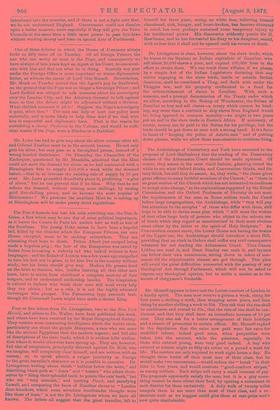The Archbishops of Canterbury and York have assented to the-
proposal of Lord Shaftesbury that the reading of the Damnatory clauses of the Athanasian Creed should be made optional. Of course, they assent in the most timid fashion, glancing round the while to see what Oxford thinks, and Convocation thinks, and the- laity think, but still they do assent. As, they write, " the clause gives great offence to many faithful members of the Church," as "there is- no great section of the Church which has not intimated its readiness to accept some change," as the explanations suggested by the Ritual Commission and the Oxford Professors of Divinity do not meet the requirements of the case, as Rome seldom reads the Creed, before large congregations, the Archbishops, while " they will pay, due attention to the scruples" of those who differ with them, still hope to be able to devise some plan which " will meet the wishes of that other large body of persons who object to the solemn use of words which they regard as unauthorized in their most obvious- sense either by the letter or the spirit of Holy Scripture." As. Convocation cannot move, the Lower House not having the brains- of the Upper one, the Archbishops should introduce a short Bill, providing that no clerk in Orders shall suffer any civil consequence- whatever for not reading the Athanasian Creed. Then Canon Liddon can read it, and Dean Stanley can omit it, and laymen. can follow their own consciences, sitting down in token of non assent till the objectionable clauses are got through. This plan will avoid the great difficulties connected with the passing of any- theological Act through Parliament, which will not be asked to express any theological opinion, but to settle a matter as to the- tenure of clergymen's freeholds.


































 Previous page
Previous page